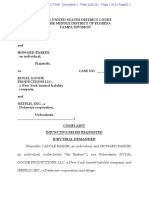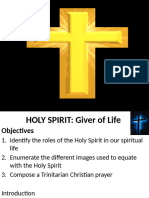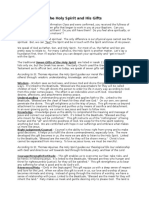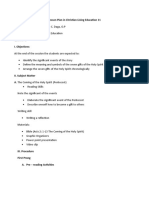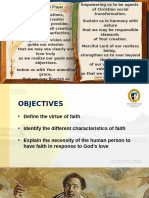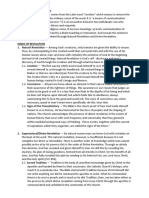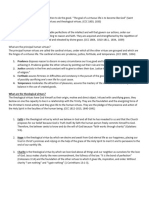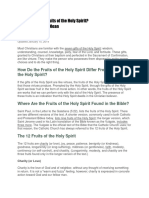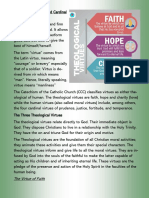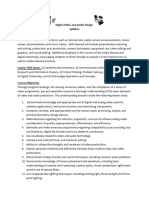0 ratings0% found this document useful (0 votes)
2 viewsRS 1 - Note 10
RS 1 - Note 10
Uploaded by
queenzeljane06Copyright:
© All Rights Reserved
Available Formats
Download as DOCX, PDF, TXT or read online from Scribd
RS 1 - Note 10
RS 1 - Note 10
Uploaded by
queenzeljane060 ratings0% found this document useful (0 votes)
2 views3 pagesOriginal Title
RS-1_Note-10
Copyright
© © All Rights Reserved
Available Formats
DOCX, PDF, TXT or read online from Scribd
Share this document
Did you find this document useful?
Is this content inappropriate?
Copyright:
© All Rights Reserved
Available Formats
Download as DOCX, PDF, TXT or read online from Scribd
Download as docx, pdf, or txt
0 ratings0% found this document useful (0 votes)
2 views3 pagesRS 1 - Note 10
RS 1 - Note 10
Uploaded by
queenzeljane06Copyright:
© All Rights Reserved
Available Formats
Download as DOCX, PDF, TXT or read online from Scribd
Download as docx, pdf, or txt
You are on page 1of 3
RS 1 – Lecture Note 9
GIFTS OF THE HOLY SPIRIT
Our Christian faith teaches us that Jesus, the Son of God, expressed each of the
attributes of the “spirit of the Lord” in their perfect fullness. Because of our participation
in Christ, we, too, are given a share of each of the gifts of the Spirit. Jesus himself
assured us of this when He promised that His Father would send the Holy Spirit upon us
in his name, to teach us everything and remind us of all that he told us (John 14:26). It
is through these seven gifts–wisdom, understanding, counsel, knowledge, fortitude,
piety, and fear of the Lord–that we grow in holiness and are continually reminded of
God’s loving presence within us and around us. This list of the 7 gifts of the Holy Spirit
is based on Isaiah 11:2. The imparting of the gifts of the Spirit is associated with
baptism, as well as Confirmation and Ordination.
According to the Catechism of the Catholic Church and descriptions outlined by
St. Thomas Aquinas in the Summa Theologica, the seven gifts are as follows:
1. Wisdom: Also, the gift of wisdom, we see God at work in our lives and in
the world. For the wise person, the wonders of nature, historical events,
and the ups and downs of our lives take on deeper meaning. The matters
of judgment about the truth, and being able to see the whole image of
God. We see God as our Father and other people with dignity. Lastly,
being able to see God in everyone and everything everywhere.
2. Understanding: In understanding, we comprehend how we need to live
as a follower of Christ. A person with understanding is not confused by all
the conflicting messages in our culture about the right way to live. The gift
of understanding perfects a person's speculative reason in the
apprehension of truth. It is the gift whereby self-evident principles are
known, Aquinas writes.
3. Counsel (Right Judgment): With the gift of counsel/right judgment, we
know the difference between right and wrong, and we choose to do what
is right. A person with right judgment avoids sin and lives out the values
taught by Jesus. The gift of truth that allows the person to respond
prudently, and happily to believe our Christ the Lord.
4. Fortitude (Courage): With the gift of fortitude/courage, we overcome our
fear and are willing to take risks as a follower of Jesus Christ. A person
with courage is willing to stand up for what is right in the sight of God,
even if it means accepting rejection, verbal abuse, or even physical harm
and death. The gift of courage allows people the firmness of mind that is
required both in doing well and in enduring evil, especially with regard to
goods or evils that are difficult, just like Joan of Arc did.
5. Knowledge: With the gift of knowledge, we understand the meaning of
God. The gift of knowledge is more than an accumulation of facts.
6. Piety (Reverence): With the gift of reverence, sometimes called piety, we
have a deep sense of respect for God and the church. A person with
reverence recognizes our total reliance on God and comes before God
with humility, trust, and love. Piety is the gift whereby, at the Holy Spirit's
instigation, we pay worship and duty to God as our Father, Aquinas writes.
RS 1 – Essentials of Catholic Faith and Life | 1
7. Fear of the Lord (Wonder and Awe): With the gift of fear of the Lord we
are aware of the glory and majesty of God. A person with wonder and awe
knows that God is the perfection of all we desire: perfect knowledge,
perfect goodness, perfect power, and perfect love. This gift is described by
Aquinas as a fear of separating oneself from God. He describes the gift as
a "filial fear," like a child's fear of offending his father, rather than a "servile
fear," that is, a fear of punishment. Also known as knowing God is all
powerful. Fear of the Lord is the beginning of wisdom (Prov 1:7) because
it puts our mindset in its correct location with respect to God: we are the
finite, dependent creatures, and He is the infinite, all-powerful Creator.
The moral life of Christians is sustained by the gifts of the Holy Spirit. These are
permanent dispositions which make man docile in following the promptings of the Holy
Spirit (CCC, 1830).
FRUITS OF THE HOLY SPIRIT
The fruits of the Spirit are perfections that the Holy Spirit forms in us as the first
fruits of eternal glory. The tradition of the Church lists twelve of them: "charity, joy,
peace, patience, kindness, goodness, generosity, gentleness, faithfulness,
modesty, self-control, and chastity (CCC, 1832)."
1. Charity is the love of God and of neighbor, without any thought of
receiving something in return. It is not a "warm and fuzzy" feeling,
however; charity is expressed in concrete action toward God and our
fellow man.
2. Joy isn't emotional, in the sense that we commonly think of joy; rather, it is
the state of being undisturbed by the negative things in life.
3. Peace is a tranquility in our soul that comes from relying on God. Rather
than getting caught up in anxiety for the future, Christians, through the
prompting of the Holy Spirit, trusts God to provide for them.
4. Patience is both the ability to endure difficult people and situations without
giving into anger or giving up hope, and the state of remaining tranquil
while awaiting an outcome.
5. Kindness is the willingness to give to others above and beyond what we
owe them.
6. Goodness is the avoidance of evil and the embrace of what's right, even
at the expense of one's earthly fame and fortune.
7. Generosity is about being honorable and charitable. For some, giving is
even considered a spiritual gift. If God has given you much, you can serve
Him by sharing it with others.
8. Gentleness in behavior is to be forgiving rather than angry, gracious
rather than vengeful. The gentle person is meek; like Christ Himself, Who
said that "I am gentle and humble of heart" (Matthew 11:29) he does not
insist on having his own way but yields to others for the sake of the
Kingdom of God.
9. Faithfulness, as a fruit of the Holy Spirit, means living our life in
accordance with God's will at all times.
RS 1 – Essentials of Catholic Faith and Life | 2
10. Modesty means humbling yourself, acknowledging that any of your
successes, achievements, talents, or merits are not truly your own but
gifts from God.
11. Self-control or temperance does not mean denying oneself what one
needs or even necessarily what one wants (so long as what one wants is
something good); rather, it is the exercise of moderation in all things.
12. Chastity is the submission of physical desire to right reason, subjugating
it to one's spiritual nature. Chastity means indulging our physical desires
only within the appropriate contexts—for instance, engaging in sexual
activity only within marriage.
RS 1 – Essentials of Catholic Faith and Life | 3
You might also like
- Lesson 9 - Current and Future Trends in Media and Info. TGDocument16 pagesLesson 9 - Current and Future Trends in Media and Info. TGEnan Garcia80% (5)
- PMP Application Assistant v6.7Document131 pagesPMP Application Assistant v6.7MedoNo ratings yet
- Christian HolinessDocument3 pagesChristian HolinessHazel UsanaNo ratings yet
- The Force of Mercy by Buddy Harrison Michael Landsman HarrisDocument30 pagesThe Force of Mercy by Buddy Harrison Michael Landsman HarrisJotham Joel100% (1)
- Gods Grace and The Hardened HeartDocument5 pagesGods Grace and The Hardened HeartJhay Ar GabuyoNo ratings yet
- Work Elementary Workbook Answer KeyDocument20 pagesWork Elementary Workbook Answer KeyGustavo MaldonadoNo ratings yet
- Baskin V Royal GoodeDocument21 pagesBaskin V Royal GoodeTHROnlineNo ratings yet
- Sermon On The Gift of The SpiritDocument6 pagesSermon On The Gift of The Spiritsolomon celestineNo ratings yet
- Holy SpiritDocument7 pagesHoly SpiritAPR7No ratings yet
- Theo 103Document2 pagesTheo 103Mei RyuzakiNo ratings yet
- 7 Gifts of The Holy Spirits 1Document5 pages7 Gifts of The Holy Spirits 1Renz BernalesNo ratings yet
- Gift S of The Holy SpiritDocument11 pagesGift S of The Holy SpiritGeraldine AgamataNo ratings yet
- Holy SpiritDocument15 pagesHoly SpiritEuan CajuraoNo ratings yet
- The Gifts of The HolyDocument3 pagesThe Gifts of The HolymhyckNo ratings yet
- Jesus Appoints PeterDocument5 pagesJesus Appoints PeterMichael TayagNo ratings yet
- What Is Confirmation?Document5 pagesWhat Is Confirmation?Angel Sacpa PaulinoNo ratings yet
- The Seven Gifts of The Holy SpiritDocument3 pagesThe Seven Gifts of The Holy SpiritLexi LugtuNo ratings yet
- Spiritual DiscoveryDocument2 pagesSpiritual DiscoveryRhea Jean BeresoNo ratings yet
- Salvation 4Document3 pagesSalvation 4nylon siaNo ratings yet
- Holy Spirit WorkshopDocument24 pagesHoly Spirit WorkshopAjin100% (1)
- 7 Gifts of The Holy Spirit: 4. FortitudeDocument1 page7 Gifts of The Holy Spirit: 4. FortitudeMonica MonicaNo ratings yet
- What Happens at The Rite of ConfirmationDocument2 pagesWhat Happens at The Rite of ConfirmationJude BesingaNo ratings yet
- The Holy Spirit and His GiftsDocument5 pagesThe Holy Spirit and His GiftsDavinchi Davinchi DaniNo ratings yet
- Csa AssignmentDocument9 pagesCsa AssignmentSonal TessicaNo ratings yet
- Life of Faith - Class 4Document3 pagesLife of Faith - Class 4Fretzie QuinaleNo ratings yet
- Confirmation 3rd-LessonDocument65 pagesConfirmation 3rd-LessonJohn Vincent SantosNo ratings yet
- Handouts I Am Empowered Member of The Church Through ConfirmationDocument3 pagesHandouts I Am Empowered Member of The Church Through Confirmationaldwin fajiculayNo ratings yet
- 7 Gifts of The Holy SpiritDocument1 page7 Gifts of The Holy SpiritBel Laurence RaninNo ratings yet
- Talents and GiftsDocument6 pagesTalents and GiftsNOWHERE-MAN0% (1)
- The Gifts of The HolyDocument2 pagesThe Gifts of The HolySonia NaiduNo ratings yet
- Church As The Temple of The Holy SpiritDocument21 pagesChurch As The Temple of The Holy SpiritKristen Janna BulaNo ratings yet
- Guide Question: Who Is The Holy Spirit in Your Life? AreDocument4 pagesGuide Question: Who Is The Holy Spirit in Your Life? AreJoshua SugpatanNo ratings yet
- Receiving God's GiftDocument18 pagesReceiving God's Giftallandbryan Grutas100% (1)
- Objections To The CreedDocument24 pagesObjections To The Creedsean lemmor y. espinosa100% (1)
- Lesson Plan in Christian Living Education 11Document6 pagesLesson Plan in Christian Living Education 11maya orosaNo ratings yet
- Fundamentals of Faith 2: © Angelica GarciaDocument16 pagesFundamentals of Faith 2: © Angelica GarciaElisabeth HenangerNo ratings yet
- Fundamentals of Faith 2 Reviewer (1ST Quarter) - C PDFDocument16 pagesFundamentals of Faith 2 Reviewer (1ST Quarter) - C PDFbmnNo ratings yet
- 1 Mans Response To Gods Revelation FAITH 1Document14 pages1 Mans Response To Gods Revelation FAITH 1harleythompson.chuaNo ratings yet
- Holy SpiritDocument4 pagesHoly SpiritMiguel CastricionesNo ratings yet
- Gifts of The Holy SpiritDocument14 pagesGifts of The Holy SpiritBejoy CherianNo ratings yet
- The Gifts of The Holy SpiritDocument48 pagesThe Gifts of The Holy SpiritFrancesca Paterno Yamsuan NiegasNo ratings yet
- The Holy SpiritDocument6 pagesThe Holy SpiritPark JeongwooNo ratings yet
- Rel Ed ReviewerDocument5 pagesRel Ed Reviewer2jointsbradNo ratings yet
- Apologetics Activity No.5Document10 pagesApologetics Activity No.5Nimfa ManualisNo ratings yet
- Baroña, Joseph (Summary)Document1 pageBaroña, Joseph (Summary)Renzel Joseph BaroñaNo ratings yet
- Notes (Revelation and Faith)Document5 pagesNotes (Revelation and Faith)hyunsuk fhebie100% (1)
- CLF 7 Q3 Week 6Document22 pagesCLF 7 Q3 Week 6johncarlo manliguezNo ratings yet
- 83 Being A Woman of Grace 1Document5 pages83 Being A Woman of Grace 1huda EcharkaouiNo ratings yet
- Lesson Plan in Christian Living Education 11Document4 pagesLesson Plan in Christian Living Education 11maya orosa100% (1)
- The VirtuesDocument3 pagesThe VirtuesAsh MicoNo ratings yet
- Fruits of The Holy SpiritDocument3 pagesFruits of The Holy Spiritmayowa.korodeNo ratings yet
- Why Is Confirmation ImportantDocument1 pageWhy Is Confirmation Importantdummount2020No ratings yet
- VirtuesDocument11 pagesVirtuesAnna AnnaNo ratings yet
- Questions/Comments E-MailDocument6 pagesQuestions/Comments E-MailArchie Gabuyo Jr.No ratings yet
- RS New ReviewerDocument7 pagesRS New Reviewerfaithhandreaa444No ratings yet
- Taking Every Thought Captive: To the Obedience of Christ. 2 Corinthians 10:5From EverandTaking Every Thought Captive: To the Obedience of Christ. 2 Corinthians 10:5No ratings yet
- Give Some Examples of How Inner-Brokenness Affects Us in Every Day LifeDocument6 pagesGive Some Examples of How Inner-Brokenness Affects Us in Every Day LifeapcwoNo ratings yet
- Characteristics of A Growing ChristianDocument16 pagesCharacteristics of A Growing ChristianKim Eroy100% (1)
- 1 Theology and FaithDocument91 pages1 Theology and Faithadrianhaber321No ratings yet
- CharlesPrice ThanksgivingDocument3 pagesCharlesPrice Thanksgivinghisglory2No ratings yet
- William Ellery Channing On Likeness To GodDocument4 pagesWilliam Ellery Channing On Likeness To GodJohn UebersaxNo ratings yet
- Intellectual Virtues: VirtueDocument6 pagesIntellectual Virtues: VirtueJundey Cartajenas BrierNo ratings yet
- Catechism For Filipino CatholicsDocument4 pagesCatechism For Filipino CatholicsCaxandra Dominique RapisoraNo ratings yet
- Jamaica Auto Show-Updated Feb16th2006Document4 pagesJamaica Auto Show-Updated Feb16th2006OMNo ratings yet
- Adobe Scan 27 Jan 2024Document2 pagesAdobe Scan 27 Jan 2024kardinyenduNo ratings yet
- The Cat That Walked by HimselfDocument5 pagesThe Cat That Walked by Himselfkayra dale larrauri67% (3)
- ABM - BF12 IIIb 7Document6 pagesABM - BF12 IIIb 7Raffy Jade SalazarNo ratings yet
- A1 Writing Assessment 2 My Au Pair ExperienceDocument4 pagesA1 Writing Assessment 2 My Au Pair Experienceraulortiz11No ratings yet
- Sophia ResumeDocument3 pagesSophia Resumeapi-490261745No ratings yet
- Tumalad V VicencioDocument2 pagesTumalad V VicencioJohn YeungNo ratings yet
- Vikas SahuDocument1 pageVikas SahuAbode ArtisanNo ratings yet
- Consent Form For SBIDocument2 pagesConsent Form For SBIannajoy natividadNo ratings yet
- Zhukovska V V 2010 English Stylistics FuDocument240 pagesZhukovska V V 2010 English Stylistics FuHazhar OsmanNo ratings yet
- Digital Video and Audio Design SyllabusDocument2 pagesDigital Video and Audio Design SyllabusMohammed Al-SororiNo ratings yet
- Manual WkhtmltopdfDocument5 pagesManual WkhtmltopdfGeorge DiazNo ratings yet
- User'S Manual Fld7 Complex Potential Electric Fields: O.W. AndersenDocument19 pagesUser'S Manual Fld7 Complex Potential Electric Fields: O.W. AndersenguestNo ratings yet
- LeeyaDocument27 pagesLeeyaJerome LatojaNo ratings yet
- Faizan ResumeDocument2 pagesFaizan Resumemuhammad naumanNo ratings yet
- Bajaj Life InsuranceDocument71 pagesBajaj Life InsuranceHoney MinhasNo ratings yet
- 116 - Gerunds-and-Infinitives - Monday 17th BEGINNERSDocument20 pages116 - Gerunds-and-Infinitives - Monday 17th BEGINNERSbenignayronaldNo ratings yet
- SAP E - S4HCON2020 Exam Practice Test Instant Access - No Installation RequiredDocument6 pagesSAP E - S4HCON2020 Exam Practice Test Instant Access - No Installation RequiredKrishna VamshiNo ratings yet
- Multiple Gestations DeliveryDocument18 pagesMultiple Gestations DeliveryCindikia Ayu SNo ratings yet
- Curriculum Map Science 10Document2 pagesCurriculum Map Science 10Marl Rina EsperanzaNo ratings yet
- Leson PlanDocument3 pagesLeson PlanA2 Dps Ni Wayan riki cahyaniNo ratings yet
- Middle School Choir Presentation Script HandoutDocument5 pagesMiddle School Choir Presentation Script Handoutapi-334651370100% (1)
- GuidelinesDocument14 pagesGuidelinesEinalial Arravan100% (5)
- Robotics Systems ReportDocument32 pagesRobotics Systems ReportkenteshNo ratings yet
- Literature ReviewDocument25 pagesLiterature ReviewMegha Sharma100% (1)
- Lexmark E120 Service Manual 4510-001Document74 pagesLexmark E120 Service Manual 4510-001Marcus LeeNo ratings yet






